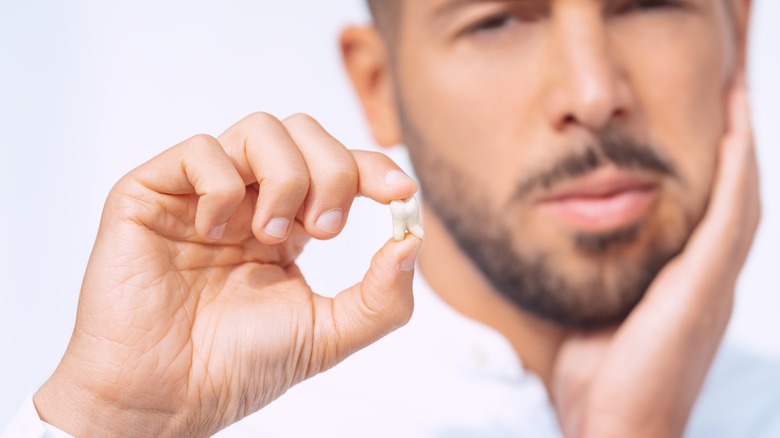Losing A Tooth Might Mean More Than You Think
Losing a tooth as a kid is usually a celebratory event — you might show everyone proudly, put it under your pillow, and get a visit from the tooth fairy. But once those "baby teeth" fall out and get replaced by permanent teeth, losing one isn't ideal. In fact, it's usually related to a deeper issue at play — and may even mean that you're at risk for cognitive decline.
Previous studies have shown that there's a link between gum disease and dementia (via Best Life). For example, one study reported by the NIH showed that antibodies created to fight off the Porphyromonas gingivalis oral bacteria might be linked to the development of Alzheimer's disease, a form of dementia.
Gum disease, or periodontal disease, begins with gingivitis, which is when the gums become red, puffy, and bleed (via CDC). If it becomes periodontitis, the gums can pull away from the teeth leading to bone loss and even eventual tooth loss. Periodontal disease affects 47.2% of adults aged 30 years and older, and the risk increases with age. It's more common in men, those living below the federal poverty level, those with less than a high school education, and those who smoke.
How tooth loss is linked to dementia
A 2021 meta-analysis published in the Journal of the American Medical Directors Association explored 14 studies that included over 34,000 participants. The review not only highlighted the link between tooth loss and dementia, but found that both dementia and cognitive impairment increased as tooth loss increased. The risk of dementia for adults with tooth loss was 28% higher, while the risk of cognitive impairment was 48% higher.
Researchers also found that the more teeth you lose, the more your risk for dementia increases (via Best Life). Each additional lost tooth increases your risk by 1.1% — and people with no teeth at all had a whopping 40% higher risk for developing dementia. Interestingly enough, people who used dentures didn't have the same risk. The researchers explained that "timely prosthodontic treatment with dentures may reduce the progression of cognitive decline related to tooth loss." It's believed that the use of dentures may correct problems with chewing that have been linked to nutritional deficiencies and neurological changes.
To prevent gum disease and possible tooth loss, be sure to brush and floss every day, per CDC. It's also important to visit a dentist at least once a year.


